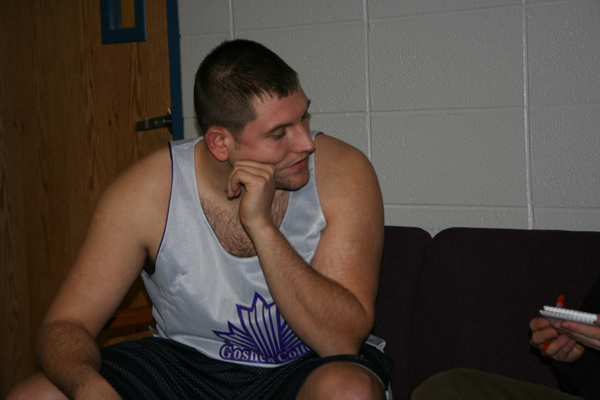For Wayne Short, a first-year, the war in Iraq is more than a news topic or campaign issue. He served two tours of duty in the war.
Short is a 24-year-old business and accounting double major with a Bible and religion minor. He lives locally in LaGrange County.When he graduated high school, Short was looking for a change. “I didn’t want to go to school anymore,” he said. Short passed up a full-ride basketball and football scholarship to Northwestern University to join the army.
He enlisted when he was 18. Short went to basic training at Fort Knox, Texas in July 2003. On four-day leaves, he drove 28 hours from Texas to Indiana, stay for two days, then go back.
Short was sent to Baghdad in June 2004. He was a first-class private with the 101st Airborne Division, and his responsibilities included clearing buildings, directing traffic checkpoints and clearing minefields.
The threat of death – like the heat – was constant.
“It was scary for the first two or three months,” Short said. “Then you accept that any day could be your day.”
During this time, Short broke his foot playing basketball. He was told that it was sprained and was ordered to walk on it. His injury eventually got so bad that he had to take the laces out of his boots to get them on or off. When he sought treatment, he was accused of faking the injury to get out of his responsibilities.
Short finished his first tour in Iraq after 18 months. He was told he would not be sent back for another two years. Since he only had around two years left on his contract, he thought that was the last he would see of Iraq.
A short time later, though, he was transferred to a different unit. Six months later, in February 2007, he was in Baghdad again – this time as a corporal. He mainly operated the gun on top of his Humvee.
On Thanksgiving Day 2007, his convoy was hit with IEDs. Pieces of shrapnel embedded themselves in his hip and broken foot. He had surgery to remove the metal. While they were operating, doctors found scar tissue on his bone from his previous injury.
For his injuries, Short received a purple heart, a merit of honor and a discharge.
It took 11 months for him to get processed out of the Army. When he finally got home, he kissed the ground.
He enrolled at Goshen College because it is the closest college to his house. Since he is a disabled veteran, the government pays his tuition.
Short is one of three veterans on campus this year.
Goshen College – with its connection to the Mennonite Church and “compassionate peacemakers” core value – may seem like an odd choice for a veteran. Short said this “hasn’t been a problem yet.”
“Just because we believe in war and don’t believe what everyone else does, doesn’t mean we shouldn’t be here,” Short said.
On top of being a student, Short has to deal with his memories of war and seeing people he knew die.
“It bothers you,” he said. “Especially if you’re sleeping or have time to think. I keep myself busy with school.”
The thing that haunts him the most is a question: what if?
After he was injured, his car was attacked. Everyone in the car died. He wonders what would have happened if he had been there. Would he have died with them? Could he have saved his comrades?
Looking back, Short has mixed feelings about his time in the military.
“I hated the military with a passion, until I got out,” he said. “Now, I hate civilian life.”
On one hand, his time in the Army changed him. He says this time was when he grew up.
At the same time, Short has advised his cousin not to enlist. Short does not like the rigidity of the military.
For now, Short’s focus is on school.



